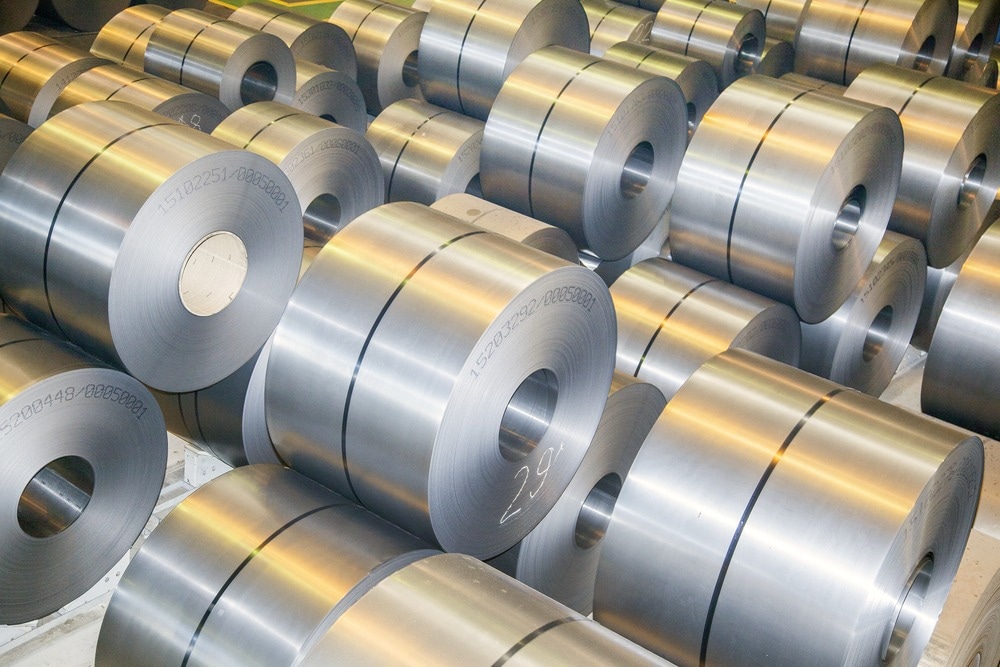Updated by Reginald Davey 19/09/22
Topics Covered
Introduction
Chemical Composition
Physical Properties
Mechanical Properties
Thermal Properties
Other Designations

Image Credit: ruhmal/Shutterstock.com
Introduction
Alloy steels are designated by AISI four-digit numbers. They contain different kinds of steels having compositions that exceed the limitations of Mn, C, Mo, Si, Ni, Va, and B set for carbon steels. They are more responsive to mechanical and heat treatments.
This article will provide an overview of the composition, properties, processing routes, and applications of ASI 4028 alloy steel. The USN number of ASI 4028 steel is G40280.
The following datasheet gives an overview of AISI 4028 alloy steel chemical composition, mechanical, physical, and thermal properties. ASI 2048 steel is a carbon steel.
Chemical Composition
The following table shows the chemical composition of AISI 4028 alloy steel.
| Element |
Content (%) |
| Iron, Fe |
98.07 - 98.67 |
| Manganese, Mn |
0.70 - 0.90 |
| Carbon, C |
0.25 - 0.30 |
| Molybdenum, Mo |
0.20 - 0.30 |
| Silicon, Si |
0.15 - 0.35 |
| Sulfur, S |
0.035 - 0.050 |
| Phosphorous, P |
0.035 |
Physical Properties
The physical properties of AISI 4028 alloy steel are listed in the following table.
| Properties |
Metric |
Imperial |
| Density |
7.85 g/cm3 |
0.284 lb/in³ |
Mechanical Properties
The mechanical properties of AISI 4028 alloy steel are outlined in the following table.
| Properties |
Metric |
Imperial |
| Bulk modulus (typical for steel) |
140 GPa |
20300 ksi |
| Shear modulus (typical for steel) |
80 GPa |
11600 ksi |
| Elastic modulus |
190-210 GPa |
27557-30458 ksi |
| Poisson's ratio |
0.27-0.30 |
0.27-0.30 |
| Hardness, Brinell |
167 - 212 |
167 - 212 |
| Hardness, Knoop (converted from Brinell hardness) |
212 |
212 |
| Hardness, Rockwell B (converted from Brinell hardness) |
91 |
91 |
| Hardness, Rockwell C (converted from Brinell hardness. Value below normal HRC range, for comparison purposes only) |
11 |
11 |
| Hardness, Vickers (converted from Brinell hardness) |
199 |
199 |
| Machinability (annealed and cold drawn. Based on 100 machinability for AISI 1212 steel) |
75 |
75 |
Thermal Properties
The thermal properties of AISI 4028 alloy steel are given in the following table.
| Properties |
Metric |
Imperial |
| Thermal conductivity (typical steel) |
44.5 W/mK |
309 BTU in/hr.ft.°F |
Processing and Manufacturing
AISI 4028 steel alloys are manufactured using different melting processes. These include vacuum induction melting, EF, LF, VD, IFF, and electroslag remelting processes. Some processes can be used in tandem, such as vacuum induction melting and electroslag remelting. These steels can be either cold or hot rolled.
Several processes are commonly utilized to furnish forged alloys. Annealing, stress relieving, normalizing and tempering processes, quenching and tempering methods, and solution treatment.
Heat treating of ASI 4028 alloy steel is performed at between 1368-1997oC. Surface finishes of the final product are either plain, cladded, or brushed. Steels are typically supplied to end users in thicknesses of 3-150 mm, widths of 1000-4500 mm, and lengths of 1000-1800mm.
Applications
ASI 4028 steels are formed into wrought products, and these alloy steels are used in several critical industrial applications. They are utilized as structural steels in airplanes, vehicles, ships, bridges, missiles, railways, and bridges. Additionally, they are employed in machine tools, pressure vessels, and mechanical components that have large sectional areas.
Power generation applications include boiler support rods and turbine fasteners. ASI 4028 alloy steels are also used as fasteners in process plants. Mechanical gears, valve rods, gear shafts, connecting rods, multidiameter shafts, bolts, and nuts all commonly use ASI 4028 steels as materials.
Furthermore, these steel alloys are used in the construction of shipping containers, warehouses, and pipeline components for several critical industries.
Other Designations
Other designations that are equivalent to AISI 4028 alloy steel include:
- ASTM A322
- ASTM A331
- ASTM A519
- SAE J404
- SAE J412
- SAE J770
Disclaimer: The views expressed here are those of the author expressed in their private capacity and do not necessarily represent the views of AZoM.com Limited T/A AZoNetwork the owner and operator of this website. This disclaimer forms part of the Terms and conditions of use of this website.